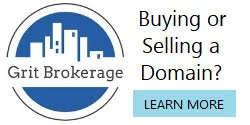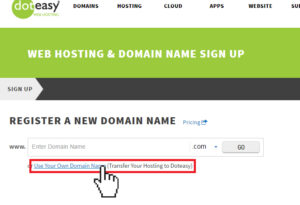Hey there! So, you’re wondering if a domain name and a website are the same thing, huh? Well, let me clear that up for you. While it may seem like they’re interchangeable, a domain name and a website are actually two different entities. It’s like comparing apples to oranges, my friend. Sure, they’re both part of the same digital ecosystem, but they serve different purposes.
Let’s break it down. A domain name is like the address of your online home. It’s what people type into their browser to find your website. Think of it as your digital street address. On the other hand, a website is the actual house itself. It’s where all your content lives – your text, images, videos, and everything in between. It’s the place where visitors come to explore what you have to offer. So, you see, a domain name and a website work hand in hand, but they’re not exactly the same thing.
Now that we’ve cleared that up, let’s dive deeper into the wonderful world of domain names and websites, shall we? Let’s explore the ins and outs of how they function and why they’re both crucial components of your online presence. So, grab a cup of coffee, sit back, and let’s embark on this exciting journey together!
No, a domain name and a website are not the same thing. A domain name is the address that people type into their browser to access a website. It is like the physical address of a house. On the other hand, a website is the actual collection of web pages, images, and other content that can be accessed at that domain name. It is like the house itself. So, while a domain name is necessary for a website to be accessible, they are two distinct entities.

Is a Domain Name and Website the Same Thing?
A domain name and a website are often used interchangeably, but they are not the same thing. Understanding the difference between these two terms is important, especially if you are planning to establish an online presence. While a website and a domain name work together to create an online identity, they serve different functions.
What is a Domain Name?
A domain name is the address that users type into their web browser to access a specific website. It serves as a unique identifier for a website on the internet. For example, “www.example.com” is a domain name. It consists of two main parts: the domain and the top-level domain (TLD). The domain is the unique name chosen by the website owner, while the TLD indicates the type of organization or country associated with the domain.
A domain name is registered through a domain registrar, and it must be unique to avoid conflicts with other websites. It is important to choose a domain name that reflects your brand or business and is easy for users to remember and type. Once a domain name is registered, it can be used for various purposes, including hosting a website, creating email addresses, or redirecting to another website.
Benefits of Having a Domain Name
Having a domain name offers several benefits for individuals and businesses. Firstly, it provides a professional and credible image, as it shows that you have invested in establishing an online presence. A domain name also allows you to have personalized email addresses associated with your domain, which can enhance your brand identity. Additionally, owning a domain name gives you control over your online presence and the ability to move your website to a different hosting provider if needed.
Registering a domain name is a relatively simple process, and it is an essential step in establishing your online identity. It is important to choose a domain name that aligns with your brand, is easy to remember, and reflects the purpose of your website.
What is a Website?
A website, on the other hand, is a collection of web pages that are hosted on a server and accessible through the internet. It is the digital space where you can share information, showcase products or services, and interact with visitors. A website consists of various elements, including text, images, videos, and interactive features.
Creating a website involves designing and structuring web pages, writing content, and adding functionality such as forms or e-commerce capabilities. Websites can be static, with fixed content that rarely changes, or dynamic, where content is regularly updated or personalized for each user. They can range from simple personal blogs to complex e-commerce platforms.
Benefits of Having a Website
Having a website is crucial for businesses and individuals looking to establish an online presence. It allows you to reach a wider audience, showcase your products or services, and provide valuable information to visitors. A website also offers a platform for interaction, such as collecting feedback, answering inquiries, or facilitating online transactions.
A well-designed and user-friendly website can enhance your brand image, improve customer trust, and drive conversions. It provides a centralized location for users to access information about your business, making it easier for them to connect with you and make informed decisions.
In summary, while a domain name and a website are closely related, they serve different purposes. A domain name is the address that users type into their web browser to access a specific website, while a website is a collection of web pages hosted on a server. Both are essential for establishing an online presence, and understanding the difference between the two is crucial when building your online identity.
Key Takeaways: Is a Domain Name and Website the Same Thing?
- A domain name is the address of a website, like a street address for a house.
- A website is the actual collection of web pages and content that can be accessed through a domain name.
- While a domain name is necessary to find and access a website, they are not the same thing.
- Think of a domain name as the sign outside a store, and the website as the store itself.
- Having a domain name is important for establishing an online presence and making it easier for people to find your website.
Frequently Asked Questions
Question 1: What is a domain name?
A domain name is the address that users type into their web browser to access a website. It is a unique string of characters that identifies a specific website on the internet. For example, in the domain name “example.com,” “example” is the name of the website and “.com” is the top-level domain.
Domain names are used to make it easier for users to remember and access websites. They serve as a digital identity for a website and are registered with domain registrars for a specific period of time, typically one year or more. It’s important to choose a domain name that reflects the purpose or content of your website.
Question 2: What is a website?
A website is a collection of web pages that are hosted on a web server and accessible via the internet. It is a digital space where individuals, businesses, or organizations can publish information, share content, sell products, or provide services. Websites can contain text, images, videos, interactive elements, and more.
Creating a website involves designing and developing web pages using programming languages like HTML, CSS, and JavaScript. Websites can be static, with fixed content, or dynamic, with content that is generated or updated based on user interactions or database inputs. Websites are accessed using domain names or IP addresses.
Question 3: How are domain names and websites related?
Domain names and websites are related but not the same thing. A domain name is the address used to access a website, while a website is the collection of web pages that are hosted on a web server. In simpler terms, a domain name is like the street address of a house, and the website is the actual house.
When a user types a domain name into their web browser, it sends a request to the domain name system (DNS) to find the corresponding IP address of the web server where the website is hosted. Once the IP address is obtained, the web browser connects to the web server and retrieves the web pages, which are then displayed to the user.
Question 4: Can you have a domain name without a website?
Yes, it is possible to have a domain name without a website. Many individuals or businesses register domain names for future use or to protect their brand. They may not have a website immediately but want to secure a specific domain name before someone else takes it.
In such cases, the domain name can be parked or redirected to another website or landing page. This allows the domain owner to reserve the domain name for future use while still maintaining an online presence. It’s important to note that parked or redirected domain names may not have their own unique content or web pages.
Question 5: Can you have a website without a domain name?
Technically, it is possible to have a website without a domain name. In such cases, the website can be accessed using the IP address of the web server where it is hosted. However, using an IP address to access a website is not user-friendly and can be difficult to remember.
Domain names are designed to make it easier for users to access websites by providing a memorable and meaningful address. Having a domain name also allows businesses or individuals to establish their online brand and create a professional online presence. Therefore, while it is possible to have a website without a domain name, it is highly recommended to have one for better accessibility and branding.
Domain names and websites: What’s the difference?
Final Summary: Are Domains and Websites the Same Thing?
So, after diving into the topic of whether a domain name and a website are the same thing, we can conclude that while they are closely related, they are not interchangeable. A domain name is like the address of a house, while a website is the actual house itself. The domain name is what users type into their browser to visit a website, while the website is the collection of webpages, images, and content that users see and interact with.
Understanding this distinction is crucial, especially for those who are new to the world of online presence. While a domain name is essential for establishing a unique online identity, it is the website that truly showcases your brand, products, or services. So, if you’re planning to build an online presence, remember that you need both a domain name and a website to make a meaningful impact.
To summarize, a domain name and a website go hand in hand, but they serve different purposes. A domain name provides the address, while the website is the actual online destination. So, whether you’re a business owner or an aspiring blogger, make sure to secure a memorable domain name and build a captivating website to leave a lasting impression on your audience. By understanding this distinction and leveraging both effectively, you’ll be well on your way to establishing a successful online presence.






